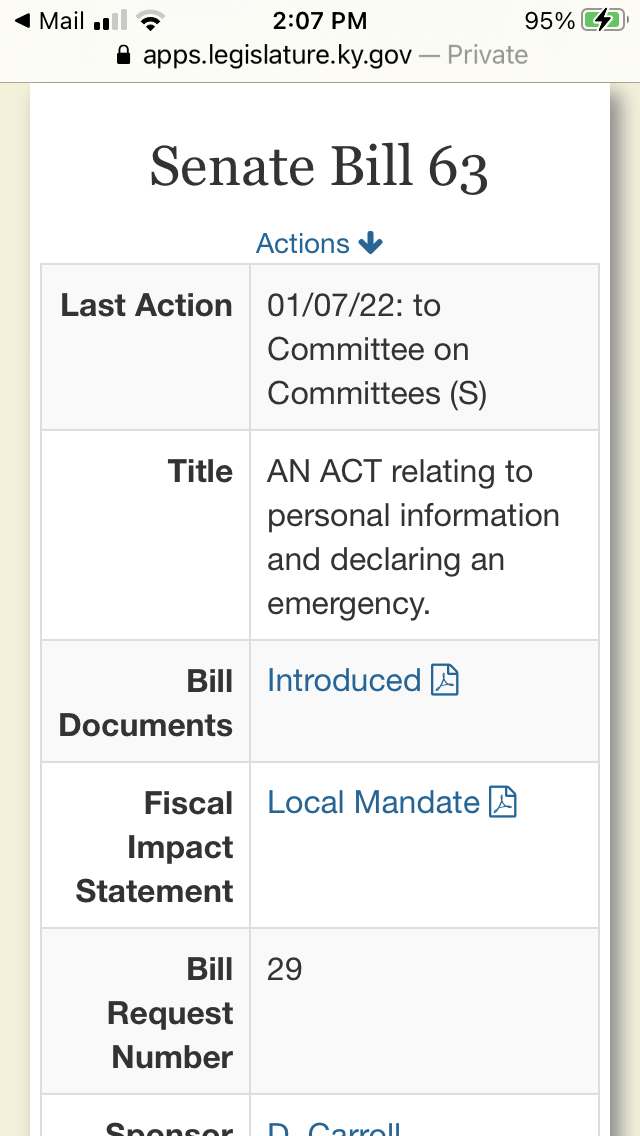

As predicted, an enhanced privacy protection bill that narrowly failed in 2021 has been filed in the current legislative session.
On January 7, 2022, SB 63 was introduced in the Senate and referred to the Committee on Committees. Sponsored by Senator Danny Carroll (R-Paducah), the bill represents an effort to extend enhanced protection to personally identifiable information about certain categories of public officials and employees.
It includes an emergency clause based on the premise that “personal information is easily published over the Internet and social media, and there has been an increase in death threats and deaths of judges and other public officials.”
If enacted, it will take effect upon passage.
If that’s where the bill stopped, it would largely duplicate the existing privacy exception to the open records law. KRS 61.878(1)(a) authorizes nondisclosure of public official/employee personal information (including, but not limited to, home address, home/personal cellphone numbers, date of birth, banking information, medical information, spouse and dependents’ identifiers) because that information is unrelated to the performance of their public duties. Disclosure does not advance the public’s right to know how the official/employee discharges their official duties. Public release is — and long has been — deemed a clearly unwarranted invasion of personal privacy.
Carroll has introduced various versions of the bill in several past sessions. Over time, his bill was pared down to a new exception authorizing nondisclosure of personally identifiable information about judges, prosecutors, public defenders, peace officers, public safety officers, CHFS social workers, employees of 911 centers, and first responders.
His efforts were mirrored, to some degree, by Representative John Blanton (R-Salyersville) in the 2021 Regular Session. But Blanton’s bill extended further, mandating redaction of personally identifiable information in public agency recordkeeping systems within three (3) business days of receipt of the request of the public official/employee, establishing dissemination of personal information relating to law enforcement as a Class A misdemeanor — and in some cases a felony — and creating a civil cause of action against the disseminator.
In the waning hours of the 2021 session, Blanton piggybacked his bill on Carroll’s bill. That bill, as noted, was vetoed, and the clock ran out for lawmakers to override the veto on the final day of the 2021 session.
SB 63 combines the worst features of both bills.
We opposed SB 48 and HB 520, and the bill drafting nightmare that resulted from their last minute marriage in 2021. We oppose the combined bills, now designated SB 63, in the current session.
if you are confused by SB 63, fear not. It remains a poorly drafted “synthesis” of two bad bills.
We explained our rationale for opposing the bills in 2021:
“Why we oppose SB 48
”The Kentucky Open Government Coalition opposes SB 48.
“Our objections are based on the fact that SB 48 upends a disclosure law — the Kentucky Open Records Act — and makes it a nondisclosure law.
“From 1976 to the present, violations of the Open Records Act have been premised on *illegal denial of inspection* of public records, or subversion of the intent of the Act short of denial of inspection.
“On and after June 29 —
the effective date of SB 48 — violations will also be premised on *illegal disclosure/inspection* of public records.
“If, that is, someone can figure out how to interpret and enforce it.
* *
How two bills became one
“SB 48 is actually two bills — SB 48, sponsored by Sen. Danny Carroll, and HB 520, sponsored by Rep. John Blanton — clumsily combined into one. This last minute consolidation — occurring on the final day of the legislative session — makes reconciliation of the language of the two bills and implementation of the resulting law — nearly impossible.
“The two bills have one thing in common. Their stated aim is to protect certain public officers — who are perceived to be at greater risk — by preventing disclosure of their ‘personally identifiable information’in public records.
“They are loosely based on a New Jersey law that was prompted by the shooting death and wounding of the son and husband of a federal judge on the judge’s doorstep.
“We know of no other such recent instances and none were cited. The tragic death of the public officer for whom Blanton’s bill was originally named — Commonwealth’s Attorney Fred Capps — occurred in 2000.
“There is no evidence that the perpetrators in either case used their respective states’ open records laws to obtain the victims’ home address.
* *
How the two bills — now one — differ and cannot be reconciled
“SB 48 contains two separate and distinct definitions of personally identifiable information. It contains two separate and distinct descriptions of a qualifying public officers —including, in Blanton’s bill, family members. It create two differing mechanisms for requesting confidential treatment of personally identifiable information. Finally, it imposes differing obligations on public agencies to which requests are submitted — one to withhold upon request the other to proactively remove any trace from existing records.
“In a word, SB 48 is an interpretational nightmare that is at odds with the current presumption in the law favoring disclosure. *How* it is implemented will largely turn on *who* is asking that it be implemented.
“Carroll’s bill requires the public officer — a term more broadly defined than in Blanton’s bill — to renew his/her request every three years and applies to ‘address and location’ only. Lack of ‘practicability’ does not relieve the agency of the duty to treat personally identifiable information as exempt.
“Blanton’s bill does not require the public officer to renew his/her request. It applies to a narrower range of public officers but a broader range of personally identifiable information. An agency that cannot comply with the Blanton requirements relating to removal of personally identifiable information from publicly posted records may avoid the duty by notifying the public officer that compliance is not ‘practicable.’
“Neither Carroll nor Blanton identify an enforcement mechanism.
“The Attorney General is not empowered to review disputes arising under SB 48. His authority is limited to to ‘review[ing] a public agency's denial of a request to inspect a public record‘ or subversion of the intent of the Open Records Act short of denial of inspection.
* *
Lawmakers fail to vet the new law
“SB 48 offers little protection to personally identifiable information that the Open Records Act does not already provide. Perhaps the greatest irony in this entire frantic 11th hour debacle is the fact that virtually no time was devoted to discussing whether there is any need for a new exception to the Open Records Act.
“The discussion should have focused on its vague wording and whether it serves its intended purpose. In the final analysis, SB 48 ignores the fact that, occasionally, the public’s interest in disclosure of personally identifiable information — like address and location — outweighs the privacy interest.
Where it does not, the existing privacy exception to the Open Records Act provides more than adequate protection.
“In a small number of cases, denial of access to a public officer’s home address may not be upheld because residency was a requirement for holding a public position. In an even smaller number of cases, denial of access to a public officer’s location (through, for example, GPS data) may not be upheld based on substantiated claims that he neglected his public duties by abandoning his post — and this, of course, after the fact inasmuch as an open records requester must ask for a record that is already in existence.
* *
Veto
“The Kentucky Press Association has indicated that it will ask the Governor to veto SB 48. While the Kentucky Open Government Coalition would also welcome a veto, it will not come without some risk to the Governor. Advocates for SB 48 will argue that he is ignoring the safety of public officers, putting them in peril by vetoing a bill aimed at protecting them.
“This, of course, is a false claim. SB 48 is little more than confusing, cumbersome, and internally inconsistent window dressing that cannot be enforced and, as noted, upends 45 years of the Open Records Act. The Governor should veto it.
“But even a veto that cannot be overridden is unlikely to stop SB 48’s proponents (and the Governor’s critics).
“Chances are good that they will be back next year with a rewrite of SB 48. If 2021 is any indicator, chances are even better that they will be back with new bills that are far worse for the public’s right to know.“


